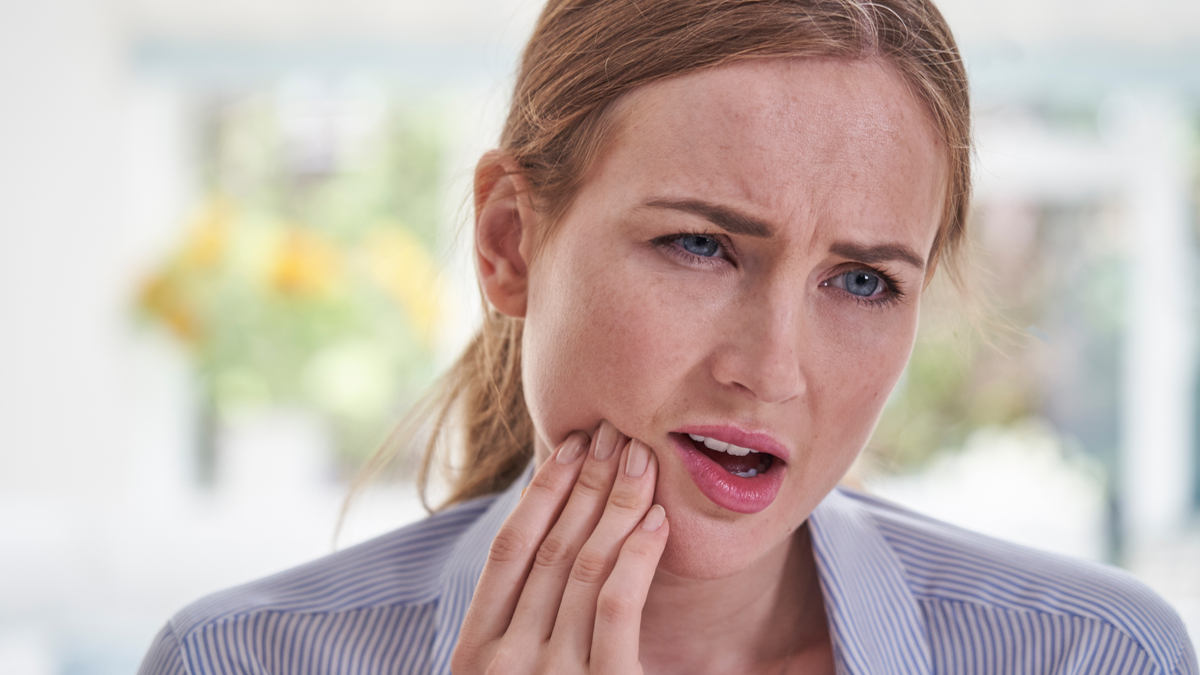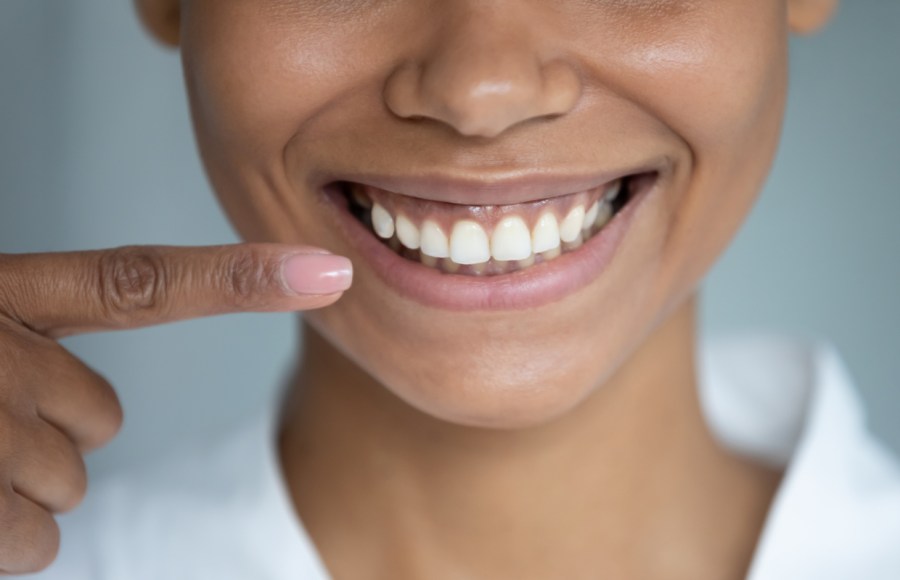Whether it’s bleeding gums, a red tongue, or sensitive teeth, the onset of a new dental problem can easily cause concern. While lots of signs and symptoms are nothing to worry about, some may indicate a specific health issue or condition, including stress, pregnancy and cancer. Read on to discover what your teeth could reveal about your health, according to the experts. We’ve also got some great tips and tricks to help you look after your oral health…
Research from the Oral Health Foundation has revealed that our nation’s dental hygiene standards significantly dropped during lockdowns. 55 per cent of adults admitted to neglecting their oral health during the ‘Stay at Home’ period, and 1 in 5 admitted to not brushing their teeth twice a day. Many more also revealed they were brushing their teeth less.
This, coupled with the fact that Dental patients in England missed over 19 million appointments in 2020, means that us Brits are facing a ‘ticking time bomb’ for the nation’s oral health.
What’s more, over eighteen months of mask restrictions means that as a nation we’ve been relying on our eyes to smile when out in public. Now though, with restrictions on masks easing in many places, our teeth are back on display once again.
You may not realise it, but our teeth can reveal a great deal about our overall health. Below, dentists outline the subtle changes and dental problems that could be the sign of something more serious…
8 common dental problems – and what they could reveal about your health

Why are my gums bleeding?
Bleeding gums could mean: Hormone imbalance
‘Swollen or bleeding gums, that usually bleed when brushing, could be a sign of gingivitis. This could mean that your hormone levels are not balanced. Hormone changes or imbalances that occur at different stages of our lives can put some women at risk of gingivitis which is a gum infection,’ explains cosmetic dentist, Dr Hanna Kinsella.
‘It can occur if the natural hormone levels are changed, for example during pregnancy, when it’s most likely to occur during the second trimester, or at other times such as during menopause. If untreated this can lead to periodontal disease which is an infection of the gums ligament and bone, and in severe cases tooth loss.’
What does a red bump on your gums mean?
A round red growth on the gum that bleeds easily could mean: Pregnancy
‘Pregnancy epulis or pyogenic granuloma is a round red growth that appears on the gum that can bleed easily,’ explains Dr Kinsella. ‘Like most gum problems during pregnancy it’s caused by hormone changes and usually resolves after birth but it’s still important to get it checked because for a small number of women it can develop into more severe gum disease.’
Why are my teeth flat?
Flat teeth could mean: Stress
‘Stress impacts our entire body, even our teeth,’ explains Dr Kinsella. ‘Tooth grinding is often related to stress and anxiety and manifests itself with worn down, or flat teeth. A lot of people who grind their teeth aren’t even aware they’re doing it because it happens at night while they’re sleeping or when they’re concentrating.
‘Flat teeth are also associated with headaches and jaw pain. Your dentist can make you a mouthguard to help reduce this or help to repair the damage that it has caused. Botox injections can help to reduce teeth grinding as well.’
What causes white patches in the mouth?
White patches could mean: HIV or cancer
‘White patches in the mouth, or Leukoplakia, are usually harmless and can be caused from smoking or other irritations or even oral thrush,’ explains Dr Kinsella. ‘However on very rare occasions white patches in the mouth can be a sign of HIV or cancer. Your dentist will examine the patch to rule out fungal infections and check it hasn’t been caused by biting. They may refer you to a specialist for a biopsy.
‘If you do have leukoplakia there’s a small risk it can progress to mouth cancer over time. Treatment for Leukoplakia isn’t always necessary but stopping smoking and reducing alcohol can help to reduce it.’
Why have I suddenly got sensitive teeth?
Sensitive teeth could mean: Repeated vomiting
‘Repeated vomiting, for instance as with patients with bulimia or hyperemesis throughout pregnancy, can cover teeth with strong stomach acids which over a prolonged period of time can damage the tooth enamel and make them sensitive because the nerve endings in the underlying layers become exposed, and more prone to decay,’ explains Kinsella.
‘It’s also best to avoid brushing teeth immediately after vomiting because this may scratch the tooth enamel. Rinse your mouth with water and then with a fluoride mouthwash.’
Why is my mouth ulcer not healing?
Persistent ulcer could mean: Mouth Cancer
‘Mouth cancer, or oral cancer, occurs when a tumour develops in the mouth, including the lips, tongue, gums and tonsils,’ explains Cosmetic Dentist, Dr Kamila Azimova. ‘The symptoms of mouth cancer include painful persistent mouth ulcers, lumps that don’t go away and unexplained tooth looseness or numbness. Sometimes it can manifest in red or white patches in the lining of the mouth and tongue.
‘Often these are picked up by the dentist during routine appointments and so this lack of routine appointments during the pandemic means that there could be a number of these cases yet undiagnosed. For this reason, it’s important to see your dentist if you spot anything unusual in your mouth because if caught early it’s usually treatable.’
What does a red tongue mean?
Red tongue could mean: Chronic iron deficiency
‘Glossitisor anemia tongue is a condition that causes the tongue to become red and irritated and inflamed,’ explains Dr Kamila Azimova. ‘The tongue’s look can change into different tones of red and swell in size when levels are low, it can also change in texture. The mouth can feel sore and cracks can appear at the corners of the lips too.’
What causes gum pigmentation?
Gum pigmentation could mean: Addison’s disease
‘Gum colour varies from one person to another and pigmentation is often linked to your complexion and skin colour, a bit like freckles on the skin,’ explains Dr Azimova. ‘However, pigmentation of the gums can also be a sign of Addison’s disease, which is a disorder that stops the adrenal glands from producing enough hormones and as this disease progresses.
‘Another cause of pigmentation of the gums is Peutz-Jeghers syndrome, which is a genetic condition that can increase the risk of developing polyps or cancer. One of the early symptoms is dark blue or dark brown freckles on the mouth, fingers and toes.’
Keep dental problems at bay: 6 oral hygiene tips

Cosmetic dentist, Dr. Hanna Kinsella, gives her top tips for upping your oral health game and looking after your teeth and gums…
1. Don’t brush your teeth straight after eating
‘Lots of people brush their teeth straight after eating, because they believe it’s important to get rid of the food from their teeth quickly. However, this can actually do more harm than good and damage the delicate tooth enamel.
‘It’s better to wait at least half an hour after eating before brushing, especially after eating acidic foods. This is because foods that contain citric acid can soften tooth enamel for a time. Brushing too soon after eating them will damage the enamel while it’s weak.’
2. You can’t clean teeth if they’re not straight
‘People often assume that having teeth straightened is purely for aesthetic purposes, however having straight teeth is essential for good oral health too.
‘This is because if your teeth aren’t straight then they are usually overlapping which creates an area that is very difficult, or sometimes impossible to clean with a brush. This makes it an ideal breeding ground for bacteria and results in tooth decay and cavities. So having teeth straightened doesn’t only look better, it also does wonders for overall oral health.’
3. Don’t hold your toothbrush tight
‘When using a manual toothbrush many people hold it tightly in their hand as if they’re making a fist around it. This enables them to grip it firmly and apply more pressure onto the brush which then applies onto the teeth. Applying too much pressure is dangerous though because it can slowly erode the tooth enamel which can’t repair itself. It can also result in sensitivity and cause gums to shrink and erode.
‘Instead, I always advise people to hold their toothbrush at the very end and use a grip as if they’re holding a pen. By holding the brush in this way you will ensure that you aren’t applying too much pressure to the brush and the teeth, therefore protecting them from damage.’
4. Don’t imagine your mouth as one thing when you’re cleaning
‘By this, I mean that in order to clean teeth properly I advise my patients to imagine that they’ve split their mouth into four sections. Within each section, they clean their teeth on the outside, inside and top for ten seconds each area. Then move onto the next quarter of your mouth and do the same.
‘By employing a system such as this it means that no areas inside the mouth are left out. Plus, no teeth are allowed to gather plaque and bacteria which results in tooth decay.’
5. Diet fizzy drinks are bad for teeth too
‘People often think that if they opt for diet fizzy drinks the lack of sugar means their teeth are safe. However, this is definitely not the case.
‘Over time sugar-free fizzy drinks can damage the tooth enamel as much as sugary ones, because of the acidity in them. This can result in cavities and tooth decay just like regular fizzy drinks.’
6. White teeth aren’t always healthy teeth
‘Just because your teeth are white it doesn’t always mean they’re healthy! Naturally tooth colour varies hugely from one person to the next. And even if you’ve got the whitest teeth amongst your friends you may still have enamel erosion, cavities and other tooth problems that need attention.
‘So, even if your teeth are perfectly white, it’s important to maintain regular dental appointments!’







